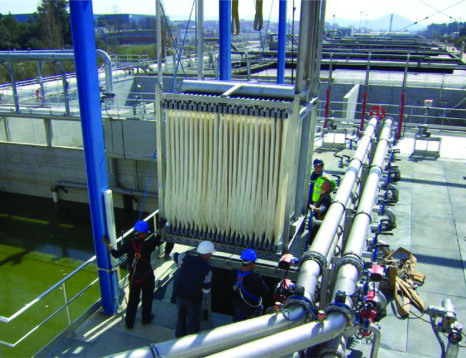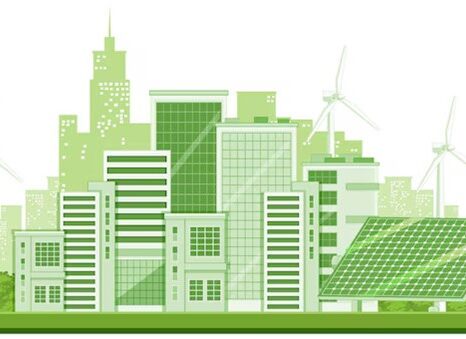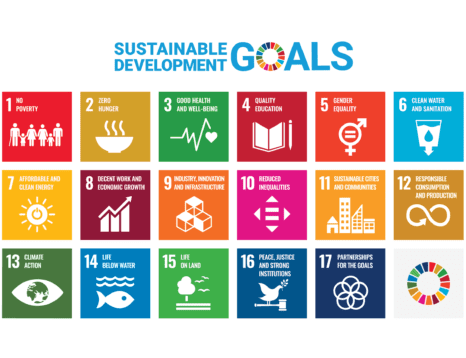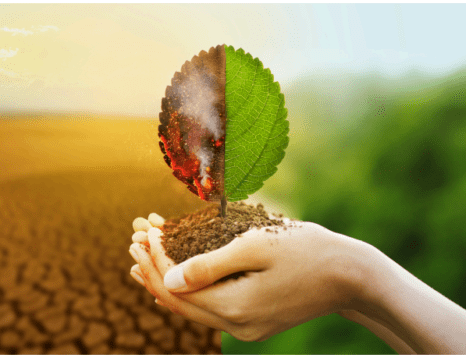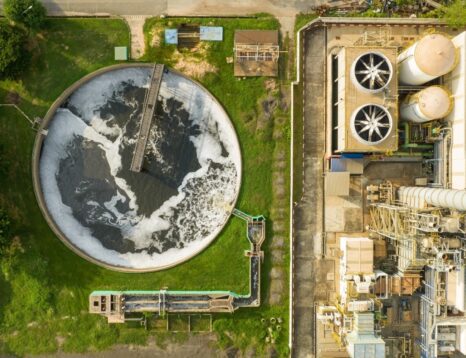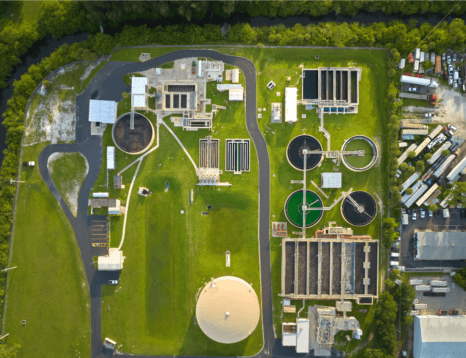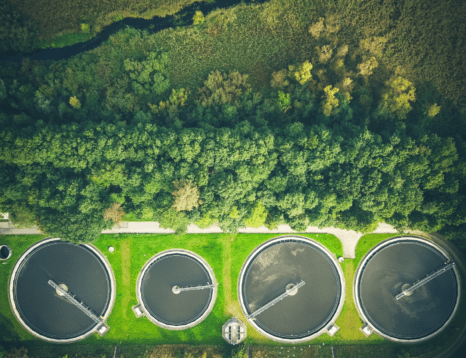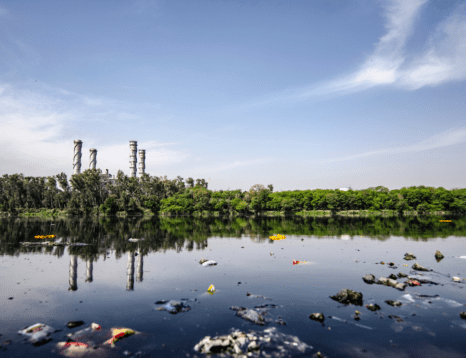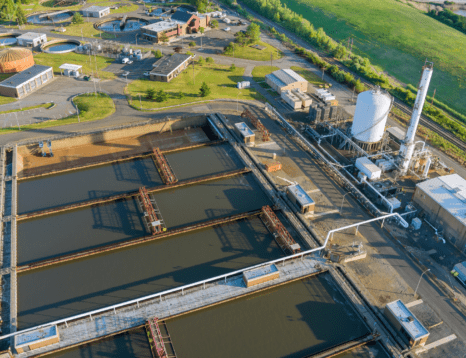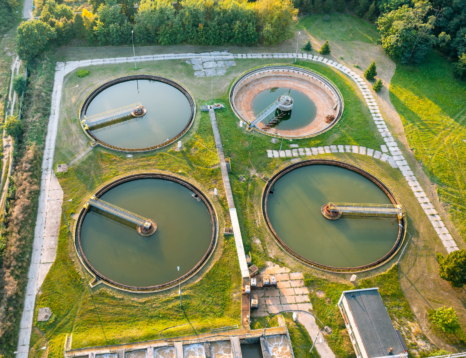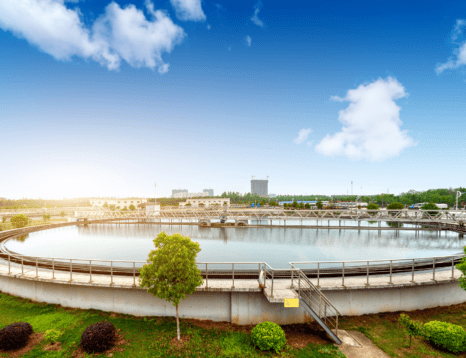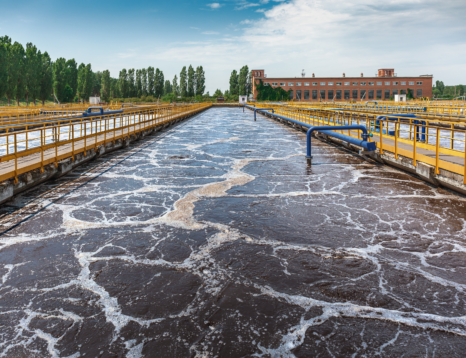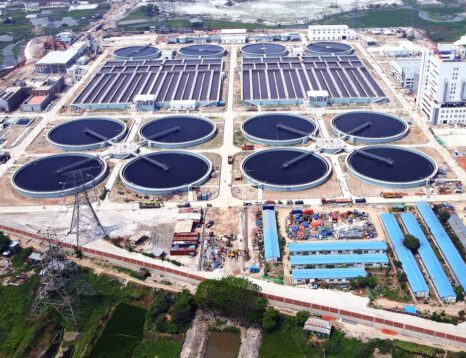
Products & Services
Waste Water Treatment Plant in Bangladesh- ETP, STP, WTP
Water treatment solutions in Bangladesh are crucial for addressing industrial wastewater, sewage, and drinking water purification. The three main types of treatment plants used are ETP (Effluent Treatment Plant), STP (Sewage Treatment Plant), and WTP (Water Treatment Plant). Here’s a detailed breakdown of each:
Effluent Treatment Plant
ETP in Bangladesh
ETPs are used to treat industrial wastewater before discharging it into the environment. Many industries in Bangladesh, including textiles, pharmaceuticals, tanneries, and food processing, require ETPs due to strict environmental regulations set by the Department of Environment (DoE) and global compliance standards.
Process of ETP:
- Preliminary Treatment – Removal of large solids using screens and sedimentation.
- Primary Treatment – Chemical coagulation and flocculation to remove suspended solids.
- Secondary Treatment – Biological treatment using aerobic or anaerobic processes.
- Tertiary Treatment – Advanced filtration (sand filters, activated carbon) and disinfection (chlorination or UV treatment).
- Sludge Management – Dewatering and disposal of solid waste.
Industries Using ETP in Bangladesh:
- Textile & Garments (Ready-Made Garments - RMG)
- Tanneries (Leather Industry)
- Pharmaceuticals
- Dyeing & Chemical Industries
- Food & Beverage Processing
Challenges in ETP Implementation:
- High operational and maintenance costs.
- Lack of proper monitoring and a skilled workforce.
Non-compliance by some industries to reduce costs.
Comprehensive Guide to Selecting
the Right ETP Suppliers in Bangladesh
Effluent Treatment Plants (ETPs) are crucial for industries to comply with environmental regulations and ensure sustainable wastewater management. Choosing the right ETP supplier in Bangladesh requires a careful evaluation of several factors, including compliance, technology, cost, and after-sales support. This guide provides a detailed roadmap for selecting the most suitable ETP supplier in Bangladesh.
Key Considerations for
Selecting an ETP Vendor
- Regulatory Compliance
-
- Ensure the vendor complies with the Department of Environment (DoE) regulations in Bangladesh.
- Verify the supplier’s ability to provide solutions meeting international environmental standards such as ISO 14001.
- Confirm if the supplier has experience in obtaining necessary permits and approvals.
- Experience and Reputation
-
- Research the supplier’s history and track record in Bangladesh.
- Look for customer testimonials, case studies, and past projects.
- Check for affiliations with reputed organizations or industry certifications.
- Technology and Customization
-
- Assess the type of technologies offered, such as Biological, Chemical, or Physico-chemical followed by biological treatment processes.
- Ensure the supplier provides customized solutions tailored to specific industrial needs.
- Verify if the supplier integrates automation and real-time monitoring systems.
- Cost and Financial Feasibility
-
- Obtain a detailed cost breakdown, including installation, maintenance, and operational costs.
- Compare quotations from multiple suppliers to evaluate cost-effectiveness.
- Consider long-term operational costs rather than just initial investment.
- After-Sales Service and Maintenance Support
-
- Ensure the supplier provides training for operational staff.
- Check the availability of spare parts and on-site support services.
- Look for annual maintenance contracts (AMCs) and post-installation support packages.
- Innovation and Sustainability
-
- Choose suppliers incorporating energy-efficient and eco-friendly technologies.
- Look for suppliers promoting water recycling and zero liquid discharge (ZLD) systems.
- Consider innovations such as IoT-based monitoring for better efficiency.
Steps to Select
the Right ETP Vendor
- Identify Your Requirements: Define your industry’s wastewater treatment needs, including the volume and type of effluents.
- Research Potential Suppliers: List down reputed ETP suppliers in Bangladesh and gather background information.
- Request Proposals and Compare: Obtain detailed proposals from shortlisted suppliers and compare their offerings.
- Conduct Site Visits and Assess Quality: Visit existing ETP installations by potential suppliers to assess performance.
- Negotiate and Finalize: Discuss terms, negotiate costs, and finalize the contract with the most suitable supplier.
Selecting the right ETP supplier in Bangladesh is a critical decision that impacts both regulatory compliance and operational efficiency. By considering factors such as compliance, technology, cost, and support services, industries can make informed decisions and invest in sustainable wastewater management solutions.
Pro Tip: Always prioritize suppliers with proven expertise, strong after-sales support, and a commitment to sustainability.
Sewage Treatment Plant
STP in Bangladesh
STPs are designed to treat domestic and municipal wastewater, including sewage from households, commercial buildings, and industrial staff quarters.
STP Treatment Process:
- Screening & Grit Removal – Removes large debris.
- Primary Treatment – Settling tanks remove sludge and scum.
- Secondary Treatment – Biological processes (activated sludge, MBBR, SBR) degrade organic matter.
- Tertiary Treatment – Advanced filtration and disinfection (UV, chlorine).
- Sludge Handling – Digestion, drying, or safe disposal.
STP Application Areas:
- Residential complexes and housing societies.
- Hotels and commercial buildings.
- Hospitals and healthcare facilities.
- Industrial staff accommodations.
Challenges of STP in Bangladesh:
- Insufficient municipal sewage infrastructure.
- Low public awareness about wastewater management.
- Poor enforcement of environmental laws.
Comprehensive Guide to Selecting
the Right STP Suppliers in Bangladesh
Sewage Treatment Plants (STPs) are essential for managing wastewater in both municipal and residential areas. Selecting the right STP supplier is crucial to ensuring efficiency, cost-effectiveness, and environmental compliance. This guide outlines the key considerations when choosing an STP supplier in Bangladesh.
Key Factors to Consider
- Regulatory Compliance
-
- Ensure that the supplier adheres to Department of Environment (DOE) Bangladesh and local municipal regulations.
- The STP must comply with Bangladesh National Building Code (BNBC) and environmental discharge standards.
- Technology & Treatment Process
-
- Evaluate the technology used, such as MBR (Membrane Bioreactor), MBBR (Moving Bed Biofilm Reactor) and Conventional Activated Sludge Systems.
- Assess energy efficiency and operational reliability.
- Experience & Reputation
-
- Choose a supplier with a proven track record in municipal and residential projects.
- Check client testimonials, case studies, and past projects.
- Customization & Scalability
-
- Ensure that the supplier can provide tailor-made solutions based on project size and wastewater load.
- The system should be scalable to accommodate future population growth or increased wastewater generation.
- Cost & Budget Considerations
-
- Get a detailed cost estimate covering installation, operation, and maintenance.
- Compare quotations from multiple suppliers for the best value.
- After-Sales Support & Maintenance
-
- Choose a supplier offering comprehensive maintenance and technical support.
- Ensure availability of spare parts and trained service engineers.
- Environmental Impact & Sustainability
-
- Opt for an STP that ensures minimal sludge generation, low energy consumption, and water reuse capability.
- Check if the supplier provides solutions for treated water reuse in irrigation, cooling systems, or industrial processes.
Selecting the right STP supplier in Bangladesh requires careful evaluation of technology, compliance, experience, cost, and after-sales support. By considering these factors, you can ensure an efficient, long-lasting, and environmentally compliant sewage treatment system for your municipal or residential project.
Water Treatment Plant
WTP in Bangladesh
WTPs are used to purify raw water from natural sources (rivers, lakes, groundwater) for safe drinking and industrial use. Bangladesh, with its dependency on surface and groundwater, faces challenges related to arsenic contamination, salinity, and industrial pollution.
WTP Process Steps:
- Coagulation & Flocculation – Addition of chemicals (alum, ferric chloride) to remove suspended solids.
- Sedimentation – Settling of heavy particles.
- Filtration – Sand and carbon filters for further purification.
- Disinfection – Chlorination, UV, or ozone treatment.
- Storage & Distribution – Clean water supply for consumption.
WTP Applications in Bangladesh:
- Municipal water supply.
- Industrial water treatment.
- Drinking water production (bottled water companies).
- Arsenic and iron removal plants in rural areas.
Challenges in WTP Implementation:
- Arsenic and salinity in groundwater.
- Rapid urbanization causing high water demand.
- Poor maintenance of municipal WTP facilities.
Bangladesh has made progress in water treatment with increasing adoption of ETPs, STPs, and WTPs, but challenges remain due to poor enforcement, high costs, and lack of public awareness. The government and private sectors need to work together to improve infrastructure, ensure compliance, and promote sustainable water management practices.
How to Choose the Right
Water Treatment Supplier in Bangladesh
- Understanding Your Water Treatment Needs
Before selecting a supplier, determine your specific water treatment needs. These could include:
-
- Industrial water purification
- Residential water filtration
- Wastewater treatment
- Reverse osmosis (RO) systems
- Water softening and conditioning
- Chemical treatment solutions
- Researching Suppliers
Look for suppliers that offer products and services aligned with your needs. Key factors to consider include:
-
- Reputation and experience in the industry
- Product range and availability
- Client reviews and testimonials
- Certifications and compliance with local and international standards
- Evaluating Product Quality
Ensure that the supplier provides high-quality water treatment systems. Consider:
-
- Use of advanced technology and innovative solutions
- Durability and efficiency of equipment
- Warranties and guarantees offered
- Compliance with WHO and Bangladesh Drinking Water Standards
- Assessing Technical Support and After-Sales Service
Reliable suppliers should offer:
-
- Installation and commissioning services
- Regular maintenance and servicing
- Availability of spare parts
- Technical training and customer support
- Comparing Pricing and Cost-effectiveness
While cost is an important factor, don’t compromise on quality. Compare:
-
- Initial purchase price vs. long-term operational costs
- Energy efficiency of the systems
- Maintenance and repair expenses
- Verifying Certifications and Compliance
Ensure that the supplier complies with:
-
- Department of Environment (DoE) regulations
- Bangladesh Standards and Testing Institution (BSTI) approvals
- International standards such as ISO and NSF
- Checking Market Reputation and References
-
- Seek recommendations from industry experts or peers
- Look for case studies of successful projects
- Visit previous installations if possible
- Choosing the Right Supplier
Based on your research, shortlist suppliers that meet your criteria. Choose the one that provides:
-
- The best balance of cost, quality, and service
- Reliable and sustainable solutions
- A strong track record of customer satisfaction
Selecting the right water treatment supplier requires thorough research and careful consideration of quality, compliance, and service support. By following this guide, you can ensure a sustainable and cost-effective solution for your water treatment needs in Bangladesh.
Technologies used in
Water Treatment
Water treatment involves several technologies to remove contaminants, improve water quality, and make it safe for consumption or industrial use. Here are some key technologies used:
- Physical Treatment Technologies
-
- Screening: Removes large debris (leaves, plastic, etc.).
- Sedimentation: Allows heavy particles to settle at the bottom.
- Filtration: Uses sand, gravel, or membranes to remove suspended particles.
- Flotation (DAF - Dissolved Air Flotation): Removes oils, grease, and suspended solids by introducing air bubbles that attach to particles.
- Chemical Treatment Technologies
-
- Coagulation & Flocculation: Chemicals (alum, ferric chloride) help clump particles together for easier removal.
- Chlorination: Uses chlorine to kill bacteria and viruses.
- Ozonation: Uses ozone gas as a powerful disinfectant.
- pH Adjustment: Uses acids or bases to control water acidity or alkalinity.
- Biological Treatment Technologies
-
- Activated Sludge Process (ASP): Uses microorganisms to break down organic matter.
- Biofilters & Trickling Filters: Bacteria grow on surfaces and break down contaminants.
- Constructed Wetlands: Natural filtration using plants and microorganisms.
- Membrane Technologies
-
- Reverse Osmosis (RO): Removes dissolved salts and impurities.
- Ultrafiltration (UF) & Microfiltration (MF): Removes bacteria and viruses.
- Nanofiltration (NF): Partially removes dissolved salts and softens water.
- Advanced Oxidation Processes (AOPs)
-
- UV Disinfection: Kills pathogens using ultraviolet light.
- Electrocoagulation: Uses electrical current to remove contaminants.
- Advanced Oxidation (AOP): Uses hydroxyl radicals (H₂O₂, UV, ozone) to break down pollutants
- Desalination Technologies
-
- Reverse Osmosis (RO): Removes salt from seawater or brackish water.
- Multi-Stage Flash (MSF) Distillation: Uses heat to evaporate and condense pure water.
- Electrodialysis (ED): Uses an electric field to remove salt ions.
- Sludge Treatment & Waste Management
- Dewatering: Reduces sludge volume using filter presses or centrifuges.
- Anaerobic Digestion: Breaks down organic sludge to produce biogas.
- Thermal Drying & Incineration: Reduces sludge volume and recovers energy.
- Emerging Technologies
-
- AI & Iot Monitoring: Smart sensors for real-time water quality monitoring.
- Electrochemical Water Treatment: Uses electrical processes to purify water.
Kingsley Group is one of the best ETP, STP, WTP Vendor in BD
Kingsley Group is a top supplier of Effluent Treatment Plants (ETP), Sewage Treatment Plants (STP), and Water Treatment Plants (WTP) in Bangladesh. They offer comprehensive services from design and construction to operation and maintenance, integrating automation and the latest technologies.
Products &
Services:
- Effluent Treatment Plants (ETP): Kingsley Group provides tailored solutions for various industries, including textiles, tanneries, power plants, and more. They have successfully completed over 150 projects across sectors such as textile dyeing, tanneries, power plants, and hospitals. Their expertise encompasses advanced technologies like Conventional Activated Sludge Process (ASP), Membrane Bioreactors (MBR), Moving Bed Biofilm Reactor (MBBR) and more.
- Sewage Treatment Plants (STP): Kingsley Group offers internationally recognized STPs suitable for both commercial and residential projects. Their solutions ensure that treated water meets environmental standards, promoting water reuse and sustainability.
- Water Treatment Plants (WTP): Kingsley provide comprehensive WTP solutions, including Iron Removal Filters (IRF), Water Softener Plants (WSP), Demineralized (DM) Plants, and Reverse Osmosis (RO) Plants. These systems are designed to address specific water quality issues, ensuring safe and clean water for various applications.
Notable
Projects
Kingsley Group has been involved in significant projects, such as constructing a Sewage Treatment Plant at the BGMEA complex , Independent University (IUB), Cotton Club (BD) Ltd These projects feature advanced Membrane Bioreactor (MBR) technology, Anaerobic Anoxic Oxidation (AAO), resulting in an odorless, compact, and cost-effective plant.
-
- RRP Pharmaceuticals ETP (Capacity 48 m3/day)
- IGLOO Ice Cream Ltd. ETP (Capacity 360 m3/day)
- ALTECH Aluminium ETP (Capacity 720 m3/day)
- Ripon Knitwear MBBR ETP (Capacity 1630 m3/day)
- BGMEA Complex STP (Capacity 125 m3/day)
- IUB (Independent University Bangladesh) STP (Capacity 250 m3/day)
- Cityscape Tower STP (Capacity 40 m3/day)
- Bijoy Rakeen City STP (Capacity 320 m3/day)
Kingsley Group distinguishes itself through its extensive project experience, integration of advanced technologies, and a comprehensive service approach that covers the entire project lifecycle. Their commitment to sustainability and innovative solutions positions them as a leading choice for environmental engineering services in Bangladesh.
In the final verdict, the supply chain for Effluent Treatment Plants (ETP), Sewage Treatment Plants (STP), and Water Treatment Plants (WTP) in Bangladesh is steadily growing, driven by increasing industrialization and environmental regulations. Several local and international suppliers provide high-quality treatment solutions, catering to industries such as textiles, pharmaceuticals, and food processing. However, challenges remain in terms of cost, maintenance, and compliance with environmental standards. Strengthening local manufacturing, improving after-sales services, and ensuring regulatory enforcement will further enhance the efficiency and sustainability of these treatment systems in Bangladesh.
Technology for a
Sustainable Future
Kingsley™ focuses on long term & sustainable future with a reliable technology.
